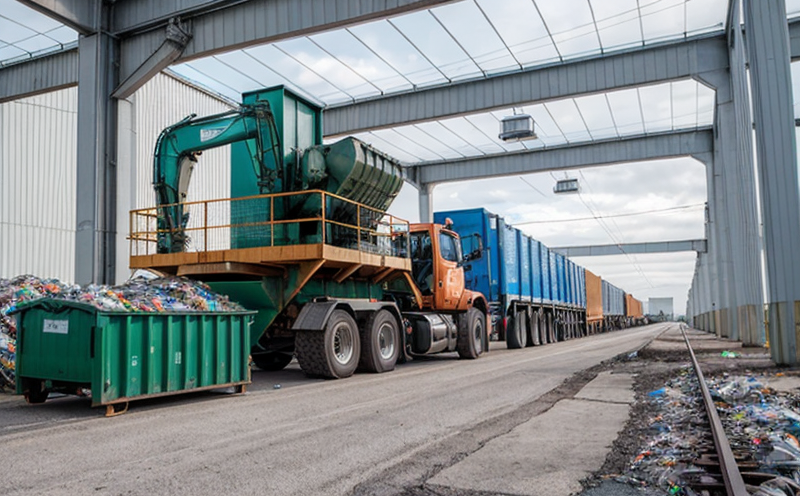Industrial Recycling & Circular Economy Process Testing
The Industrial Recycling and Circular Economy Process Testing category focuses on ensuring that industrial manufacturing processes are optimized for sustainability, resource efficiency, and compliance with global standards. This service ensures that recycling processes meet the stringent requirements of international standards such as ISO 14001, ISO 56002, ASTM D7839, EN 13361, and IEC 62391.
Our testing services are designed to help companies in the industrial sector understand how well their recycling processes align with circular economy principles. By providing detailed insights into material recovery rates, energy efficiency, and environmental impact, we enable businesses to make informed decisions that enhance sustainability and reduce waste.
The primary goal of our Industrial Recycling & Circular Economy Process Testing is to ensure that manufacturing and processing operations adhere to the latest regulatory requirements while also improving resource utilization. This service plays a crucial role in supporting companies as they transition towards more sustainable practices, ensuring that their processes are both efficient and environmentally friendly.
Through rigorous testing, we assess various aspects of recycling processes including chemical composition analysis, mechanical property evaluation, energy consumption measurement, and lifecycle assessment. These tests provide comprehensive data on the quality and performance of recycled materials, helping manufacturers to optimize their production methods and improve overall sustainability.
We also offer specialized testing services for specific types of waste streams such as plastics, metals, glass, paper, and electronics. Each type of material requires tailored approaches due to its unique properties and potential applications in new products.
Our experts use advanced analytical instruments like Fourier Transform Infrared Spectrometry (FTIR), Inductively Coupled Plasma Mass Spectrometry (ICP-MS), X-ray Fluorescence Spectrometry (XRF), among others, to conduct these tests accurately and reliably. The results are presented in detailed reports that include recommendations for process improvements based on the findings.
By leveraging our expertise in Industrial Recycling & Circular Economy Process Testing, companies can gain valuable insights into their recycling operations, identify opportunities for improvement, and contribute positively towards achieving global sustainability goals.
| Test Parameter | Description |
|---|---|
| Material Recovery Rate | The percentage of waste material that can be effectively recycled into new products. |
| Chemical Composition Analysis | Detailed analysis of the chemical composition of recycled materials to ensure they meet specified quality standards. |
| Mechanical Property Evaluation | Evaluation of physical properties such as tensile strength, yield limit, elongation at break, etc., of recycled products. |
| Energy Consumption Measurement | Assessment of the amount of energy required during various stages of recycling to determine efficiency and environmental impact. |
| Lifecycle Assessment | An in-depth evaluation covering all phases from raw material extraction through product end-of-life disposal, focusing on environmental impacts throughout the lifecycle. |
Our testing services are particularly valuable for quality managers, compliance officers, R&D engineers, and procurement professionals who need accurate data to support decision-making processes related to sustainability initiatives within industrial manufacturing environments.
By partnering with us, you will receive expert guidance on implementing best practices that align your recycling operations with global standards and contribute positively towards a more sustainable future.
Scope and Methodology
The scope of Industrial Recycling & Circular Economy Process Testing encompasses a wide range of activities aimed at ensuring that industrial processes are optimized for sustainability. This includes evaluating the efficiency of waste reduction strategies, assessing material quality before and after recycling, analyzing energy consumption during different stages of processing, and conducting lifecycle assessments to understand environmental impacts.
- Material Quality Assessment: We analyze the chemical composition, mechanical properties, and physical characteristics of recycled materials using state-of-the-art instrumentation.
- Energy Efficiency Analysis: Our experts measure and evaluate energy usage at various points in the recycling process to identify areas where improvements can be made.
- Lifecycle Assessment: Comprehensive evaluations are conducted throughout the entire lifecycle of products, from raw material sourcing through final disposal or reuse, focusing on environmental impacts.
The methodology we employ involves collecting samples from different stages of the recycling process, performing detailed analyses using high-precision instruments, and compiling results into comprehensive reports. These reports serve as valuable resources for decision-makers looking to enhance sustainability within their operations.
International Acceptance and Recognition
- ISO 14001 Certification: Our testing services are aligned with ISO 14001 certification, which sets international standards for environmental management systems.
- ASTM D7839 Standard Practice: We follow ASTM D7839, a standard practice for conducting tests on recycled plastics to ensure they meet specified quality criteria.
- EN 13361 Guidelines: Our methodologies comply with EN 13361 guidelines for assessing the mechanical properties of recycled metals.
- IEC 62391 Specifications: We adhere to IEC 62391 specifications when testing electronic waste streams to ensure compliance with industry standards.
The recognition we receive from adhering to these international standards and guidelines ensures that our clients can trust the accuracy and reliability of our test results. This aligns them with global best practices in sustainability and resource management, providing a competitive edge in their respective markets.
Competitive Advantage and Market Impact
- Innovation Leadership: By staying at the forefront of sustainable practices through our testing services, we help companies innovate and stay ahead in a rapidly evolving market.
- Sustainability Reputation: Adhering to international standards enhances a company’s reputation as a leader in environmental responsibility, which is increasingly important for attracting customers and investors.
- Cost Savings: Our detailed analyses help identify inefficiencies early on, allowing companies to implement corrective actions that can lead to significant cost reductions over time.
- Better Decision-Making: Accurate data provided by our tests enables better informed decisions regarding process improvements and new product development, leading to enhanced competitiveness.
The implementation of sustainable practices supported by rigorous testing not only improves operational efficiency but also contributes significantly to reducing the overall carbon footprint. This can translate into long-term benefits for businesses operating in sectors where sustainability is becoming a critical factor for success.





